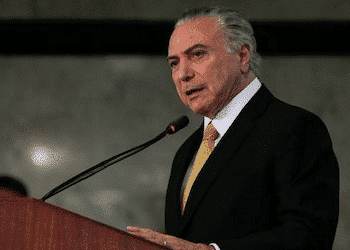The first sitting president in the history of Brazil to face criminal charges has been indicted once again, this time for allegedly obstructing justice and leading a criminal organization. Congress blocked the first set of charges from advancing. Will it protect the president a second time?
A federal indictment released on September 14 accuses Brazilian President Michel Temer of leading a criminal structure of corrupt politicians from the Brazilian Democratic Movement Party (Partido do Movimento Democrático Brasileiro – PMDB), including the now-jailed former speaker of the lower house of congress, Eduardo Cunha. The charges stem from ongoing investigations into what may be the largest graft scheme in modern history.
Three other former officials and two current cabinet members were also accused of belonging to the criminal group described by the Attorney General’s Office. These include former lower house speaker and ex-minister Henrique Alves, former congressional representative and ex-minister Geddel Vieira Lima, former congressional representative and ex-presidential adviser Rodrigo Loures, as well as current cabinet members Eliseu Padilha and Moreira Franco, all belonging to the PMDB.
The group allegedly netted some $190 million (587 million reais) in bribes by conspiring to place allied officials in important government positions, where they could award public contracts to private companies in exchange for kickbacks. Some of these suspected relationships were outlined in a diagram submitted this week to the Supreme Court by the Federal Police. (See below)

(Police diagram of the alleged “gang” within the PMDB, courtesy of Folha de São Paulo)
According to the Attorney General’s Office, the criminal structure led by Temer had a “transnational character, which can be principally demonstrated by two of its money laundering methods: international bank transfers, usually with three or more levels of concealment to hide the assets’ origins; and the acquisition of financial institutions based abroad, with the objective of controlling their compliance practices and thus complicating the work of the authorities.”
Temer allegedly assumed leadership of this network in May 2016, when he became interim president of Brazil following a decision by the Senate to initiate impeachment proceedings that suspended then-President Dilma Rousseff from office. (Rousseff was eventually ousted in the impeachment process, but not for reasons related to alleged corruption on her part.)
“With the reformulation of the political nucleus of the criminal organization, the members of the [PMDB criminal structure], especially Michel Temer, came to occupy a prominent role that had previously been held by members of the PT,” the Attorney General’s Office said, referring to Rousseff’s Workers’ Party (Partido dos Trabalhadores – PT).
Prosecutors charged Rousseff and her predecessor as president, Luiz Inácio “Lula” da Silva, along with several other former high-level PT officials earlier this month, accusing them of forming a similar structure within their own party. The indictment in that case alleges that the PT, during its 14-year control of the presidency, facilitated the growth of a massive graft scheme involving various political parties and large companies, which also entailed influence peddling and illicit campaign financing.
SEE ALSO: Elites and Organized Crime
Additionally, the new indictment accuses Temer of obstructing justice by encouraging Brazilian meat packing tycoon Joesley Batista to pay hush money to former lower house speaker Cunha as well as Lúcio Funaro, an informal money exchanger with ties to the PMDB. Both Cunha and Funaro are jailed on corruption charges and are reportedly cooperating with authorities to provide information on Temer as part of plea bargain agreements.
Temer was previously charged with “passive corruption” in June of this year for allegedly receiving a $152,000 bribe from Batista. However, two-thirds of Brazil’s lower house congress must give approval for the prosecution of a sitting president to proceed, which the body declined to do in relation to those charges in an early August vote.
InSight Crime Analysis
The new charges against Temer are among the most explosive yet from authorities who have unveiled extensive corruption in Brazil as part of the multi-year anti-graft investigation known as Operation Car Wash (“Operação Lava Jato”). But despite the disturbing nature of the accusations, congress seems inclined to spare the president from prosecution once again.
Self-interest may be the main motivating factor. As InSight Crime has previously pointed out, Temer and members of congress — a third of whom have been implicated in the Car Wash scandal — have made previous efforts to shield themselves from the wide-ranging anti-corruption probe.
Indeed, the new indictment argues that the successful drive to impeach Rousseff, led largely by Cunha, was the result of an effort to protect corrupt PMDB members from the unfolding investigation by securing the party’s control of the executive branch. Even though the reasons for ousting Rousseff had nothing to do with corruption, powerful political players apparently believed that they could “stop the bleeding” from the Car Wash probe by removing the PT president and installing a PMDB replacement.
SEE ALSO: Brazil News and Profile
Observers say Temer is likely to muster the congressional support needed to block this second set of charges from proceeding. However, it could be politically costly for the already unpopular president, who is also seeking congressional backing for a similarly unpopular economic reform agenda. Current lower house speaker Rodrigo Maia declined to speculate about the likely outcome of the vote on the corruption charges against Temer, but told Estadão that the legislative body would give “priority” to the “very serious” matter.
Whether or not the charges stick, it is likely that “systemic corruption” will continue to reign in Brazil, at least in the short term.
The “alleged wrongdoers remain politically active, able to change the way laws are written in Brazil, [and have the] potential to engage in corrupt acts,” American University professor Matthew Taylor told InSight Crime this week after the announcement of similar charges against other PMDB operators.

